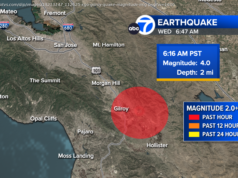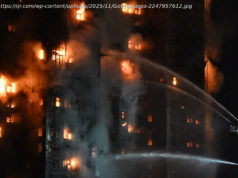Gaza militants fired dozens of rockets at southern Israel on Tuesday, killing a man in a strike on a residential building and vowing to further escalate their attacks if Israel keeps bombing the Palestinian territory.
JERUSALEM — Gaza militants fired dozens of rockets at southern Israel on Tuesday, killing a man in a strike on a residential building and vowing to further escalate their attacks if Israel keeps bombing the Palestinian territory.
As fighting raged throughout the day, Israeli Prime Minister Benjamin Netanyahu met with his Security Cabinet for six hours. The Cabinet ordered the military to « continue operations as needed. »
Hamas leader Ismail Haniyeh meanwhile signaled a readiness to halt the latest round of fighting, saying the Islamic militant group would stop its rocket fire if Israel halts its airstrikes.
The heavy exchange of fire, which was triggered by a botched Israeli undercover raid into Hamas-ruled Gaza late Sunday, marked the most serious escalation since an Israel-Hamas war in 2014.
International mediators appealed for restraint, hoping to avert another war.
The Israeli military said some 400 rockets and mortars have been launched from Gaza since Monday afternoon, with about 100 of them intercepted by Israel’s Iron Dome defense system.
Israel said it has struck more than 100 targets it says are linked to militants in Gaza, including a strike that destroyed Hamas’ TV station. Three other buildings believed to be connected to Hamas were destroyed, it said.
On Tuesday, Gaza’s Health Ministry said three Palestinians in their 20s were killed in separate airstrikes, raising the number killed since the Israeli offensive began to seven, including five militants. At least 25 people have been wounded.
Israeli medical officials said a 48-year-old man was found early Tuesday under the rubble of a building hit by a rocket in the southern city of Ashkelon.
Relatives in the West Bank town of Halhoul identified the man as Mahmoud Abu Asbeh, a Palestinian laborer who had been working in Israel. He left a wife and six children behind.
« Everyone in town is sad. It’s God’s will and there’s nothing we can do about it, » said his cousin, Jihad Abu Asbeh.
Nearly 30 people have been wounded in Israel, three critically, according to medical officials.
The military said jets struck several « key strategic » Hamas targets, including military compounds, rocket launching posts and part of its vast underground tunnel network. Also targeted was a Gaza City building serving Hamas’ military and intelligence forces that houses a munitions warehouse.
It was unclear whether Netanyahu was prepared to escalate the offensive. Earlier this week, he said he was trying to avoid an unnecessary war.
Israel has fought three wars with Hamas since the Islamic militant group seized control of Gaza in 2007. Thousands of Palestinians and scores of Israelis have been killed, while Hamas has remained firmly in power and Israel has faced international criticism.
It is unclear what either side would gain in another round of sustained fighting. But if the rocket fire persists, Netanyahu’s coalition partners, including hard-liners on the Security Cabinet, are likely to press for tougher action.
Hamas faces a similar dilemma: another war would bring new devastation to Gaza, but the group does not want to be seen as caving to Israeli pressure.
The armed wing of Hamas threatened to step up its attacks and fire rockets further north toward the Israeli cities of Ashdod and Beersheba if Israel continued its airstrikes.
The spokesman for the Hamas military wing, identified only as Abu Obeida, said the deadly attack on the coastal city of Ashkelon showed the city « has entered the range of fire as a response to the bombing of buildings in Gaza. » He said Ashdod and Beersheba « are the next targets if the enemy continues bombing civilian buildings. »
School was cancelled in large parts of southern Israel and a local election was postponed because of the threat of further attacks.
Over the past few months, the sides have come close to a major escalation several times, only to step back in favor of giving Egyptian mediation a chance.
The United Nations and Egypt have said they are trying to broker a cease-fire, but the ferocity of the latest fighting could make that difficult.
The rocket fire was triggered by a botched Israeli raid in Gaza on Sunday. Undercover troops, apparently on a reconnaissance mission, were discovered inside Gaza, setting off a battle that left seven militants, including a Hamas commander, and a senior Israeli military officer dead. Hamas then fired a guided missile that struck a bus from which soldiers had just disembarked, critically wounding a 19-year-old soldier.
Lt. Col. Jonathan Conricus, a military spokesman, said Israeli forces were targeting facilities belonging to the two main Gaza militant groups behind the rocket attacks — Hamas and Islamic Jihad.
He said the Israeli military has enhanced its deployment along the frontier but has yet to call up reserves. He said Gaza militant groups were believed to have an arsenal in excess of 20,000 rockets and mortars of different caliber and range.
In Gaza, schools and public institutions were closed as people ventured outside to inspect the damage after a long night of aerial raids. Near the destroyed TV station, residents salvaged papers and belongings from their damaged homes. Debris was strewn across the streets and glass crunched underfoot.
In Gaza City’s Rimal neighborhood, a six-story residential building that housed a kindergarten on its ground floor was destroyed.
« All the people here are civilians, children and families. We took our children and fled from here. When we returned, we found great destruction, » said Mamdouh al-Shurafa, a resident of the building. « When we are bombed in the middle of the city, where can we go? »
In the most recent war, over 2,200 Palestinians were killed, more than half of them civilians, and tens of thousands were left homeless. Seventy-three people, most of them soldiers, were killed on the Israeli side.






